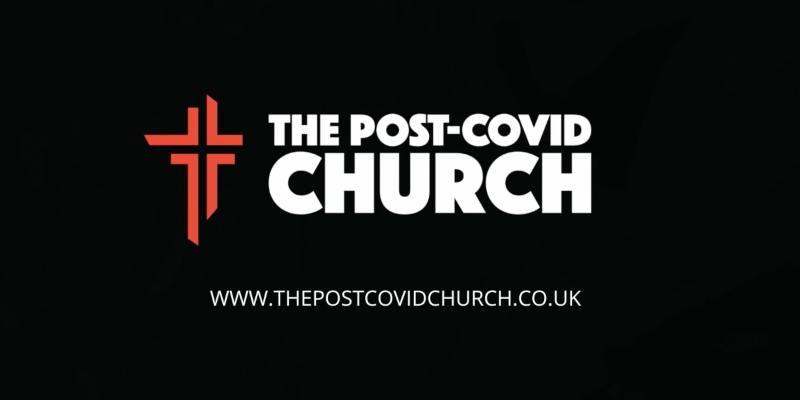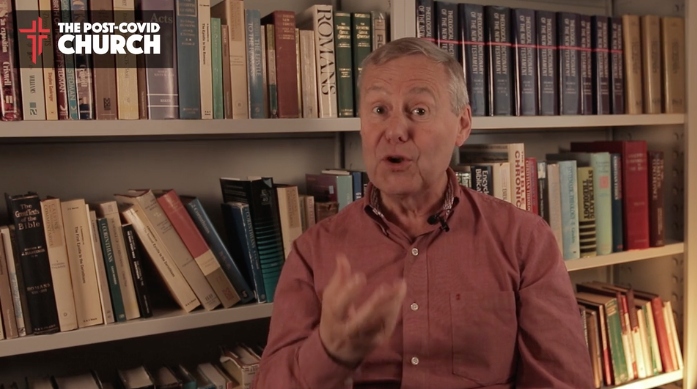Help for the Post-Covid Church
Former Baptist Union President Stephen Gaukroger has created a course to equip the church as we emerge from lockdown. In this interview he shares advice for congregations asking “What next?”
Stephen was in conversation with Darren Blaney, pastor of Herne Bay Baptist Church

Churches across the country are starting to emerge from lockdown with a whole host of questions and issues. Not least amongst them is “where do we go from here?” Many church leaders feel that God has not put us through all that we have experienced in the last 18 months simply to go back to “business as normal”. Yet for many others, getting back to things the way they were is a top priority.
Then there is the issue of what any new approach might look like - to want to change is one thing, to know what to change to is quite another. The Baptist Times recently met-up with Baptist pastor and former Baptist Union President Stephen Gaukroger and put these questions, along with many others, to him.
Darren: Stephen, what have you been up to during lockdown? Much of your ministry involves travelling and speaking overseas. That’s not been so easy of late!
Stephen: In 2019 I did a total of 11 messages on video. In 2020 it was 300 on video! So I’ve still been able to preach all over the world, albeit from my living room. And then there have been the phone calls and zoom conversations with denominational and mission leaders from all over the globe, all keen to explore one question--how do we lead in this new era?
Perhaps that is a good place to start. How do we lead?
Relationally. If there is one thing above anything else that I think Covid has reminded us of, it is how vitally important relationships are. That is true in churches and especially in church leadership. Bits of paper and emails don’t cut it. Relationships are everything. Covid hasn’t changed that, it’s just made it more necessary than ever…and more difficult.
Secondly, we lead with hope. The news and media in the UK have been dominated by fear. I don’t hear the same tone being struck in other countries, even those who have had it worse than us. Coronavirus has completely dominated the news agenda but everything has been couched in very negative, fear-inducing ways. It is vital at this time that Christian leaders counter this atmosphere with an emphasis on hope.
Then, lastly, I would say we lead forward. What I mean by that is that whatever your views on church, worship, ministry or mission, we are not going to go back to the way things were. That is simply not going to happen. The question is not whether we go forward or not, but rather how we go forward.
 Is that what lies behind your decision to produce a course on the Post-Covid Church?
Is that what lies behind your decision to produce a course on the Post-Covid Church?
Yes, absolutely. I wanted to make something available to churches that was easy to use and would help them begin to explore both scripturally and practically some of the issues that we’re going to face in the months ahead. And above all, I wanted to make it free, so that anyone and everyone could have access to it. It’s designed so that individuals can use it on their own, or leadership teams can work through it together. It’s also ideal for homegroups. I want as many people as possible to engage with these issues that we’re all going to have to address.
So how does it work?
There are eight videos in the series. Each one focuses on a particular issue or topic that I think is a key one in our post-covid setting. There is a ten-minute talk from me when I outline some of the relevant data and trends in our society and then bring God’s Word to bear on the subject. Out of that comes ‘Four by Four’ - four minutes in which I suggest four practical things that Christians or churches can begin doing today to address the issue.
Finally there is a ‘Two-Minute Testimony’ where someone shares how they have been trying to come to terms with this in their own situation. We have deliberately drawn these testimonies from all over the world. We’ve got a North American professor, a pastor from Singapore and other ordinary Christian believers like you and me trying to work these issues out where they live and work.
So what sort of things do you address?
To start with I want to get people’s eyes back on Jesus. There has been such an emphasis on the virus, on fear, on Covid statistics that it’s all too easy to be focused on death instead of on the Author of Life. I also want us to deal with the very real issue of loss. These 18-months have taken so much from so many people. How do we respond to that as Children of God?
Then there is the whole issue of mission. The communities we live in have been deeply wounded by all that has gone on. Now as followers of Jesus we have something very special, something we take for granted, we are a community. How can we minister into that brokenness around us in Jesus’ Name?
I also want us to reimagine mission. I know many churches felt that they had little choice under the circumstances but to close. I understand that. But I wonder if, in some ways, it was a mistake? It sent the message that the church wasn’t essential. Supermarkets stayed open. Hospitals stayed open. So did the Police and the Ambulance service. They did all they could to keep schools open. Why? Because these things are essential.
Well so is the church! We ought to think of ourselves as a spiritual emergency service, just as vital in its own way as all the others. I really want churches to get a vision for this. What we do is vital.
So having watched the videos, there are discussion questions for people to talk about?
No, I don’t want people to discuss these issues, I want them to decide what they are going to do about them. This isn’t a course where you watch a video, say ‘that was nice’ and then spend half-an-hour discussing whether you think face masks were a good idea or not. This is about practical things we need to be doing to be the people of God for this time and in this place. What are the challenges? What are the opportunities? What are we going to do?
And you think there are opportunities?
Absolutely. If you think about what our society has been through - shops have closed, jobs have been lost, cancer care has suffered, there is an emotional and mental health crisis looming, one that isn’t going to get better any time soon. These are massive opportunities for churches both to show the love of Christ and to bring a message of hope.
But there are challenges too?
Of course. One of them is the whole matter of continuing with an online service. I know many churches are very keen on this. Churches are talking about continuing in mixed mode, with both a physical, in-church service and an online version. I know many people who don’t normally attend church have connected with online services but I think we need to think this through a bit more carefully.
There is a danger that streaming a service can create the very problem it is meant to solve. I deal with this in one of the sessions in “Post Covid Church”. For church to function fully as God intends it to, we need to be ‘in the room, not just on zoom’. If we are not careful instead of building a community we build a very detached and diffuse network. People can easily become conspicuous consumers of a spiritual product, rather than devoted disciples within a committed community. In the end, you can’t do church in your pyjamas on your sofa. You have to engage with real people in committed relationships.
Then I think a lot of churches are going to face financial pressures. There has been a loss of rental income in many places, and that may take a while to build-up again. Then some people have got out of the habit of giving regularly to church simply because they are not physically there. Yet others of course have lost their jobs.
Then you have to add-in those who have stopped attending at all and may not come back. I suspect that many congregations will be noticeably smaller after all of this. All of that means that many churches who could only just afford a full-time Pastor previously might not be able to now. I’m concerned that this will affect more churches than we realise.
The other great danger is division. I am hearing in a lot of churches that there seems to be two groups of people. One is all for change, and that by yesterday! The other group is, in many cases, still too nervous and anxious to come back to church in person, let alone to start talking about radical change. Holding those two groups together over the coming months will not be easy. I worry that some people on both sides will simply walk away.
You also think there is a political danger too? That might surprise many people.
I have received many letters and phone calls from senior Christian leaders from many parts of the world, especially where the church is persecuted. They have warned me, ‘you know what comes next, don’t you?’ Their worry is that now the UK government has intervened once in the affairs of the church it will find it all to tempting to do so again. I know churches acted in good faith but we may find that the government wants to interfere with church life much more in the future, especially if we stand for things that are out of step with its policies or with society in general. I’m not saying it will. I’m saying we need to be watchful.
What would be your final message to readers of The Baptist Times?
The church is a community of hope in Jesus Christ. We need to realise how vital and powerful that is today. People are isolated. There is an epidemic of loneliness. Yet we can offer genuine relationships within community. People are anxious and afraid. Yet we can offer real hope. This is a time of many challenges, but it also a time of tremendous opportunity. Have the faith to see it, and the courage to pursue it.
Stephen Gaukroger is the director of Clarion Trust International. He was in conversation with Darren Blaney, pastor at Herne Bay Baptist Church.
For more on the Post-Covid Church course visit: thepostcovidchurch.co.uk
To learn more about Stephen & Clarion Trust visit: clariontrust.org.uk
Do you have a view? Share your thoughts via our letters' page.
Baptist Times, 25/08/2021